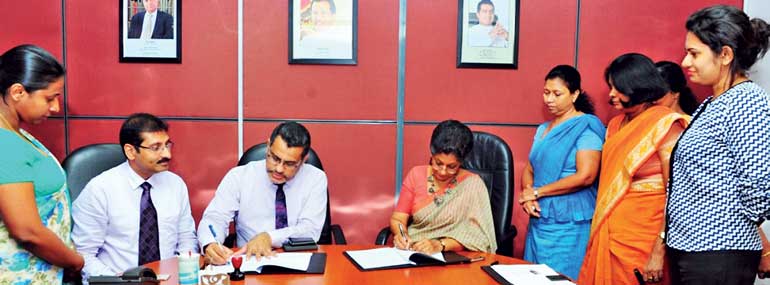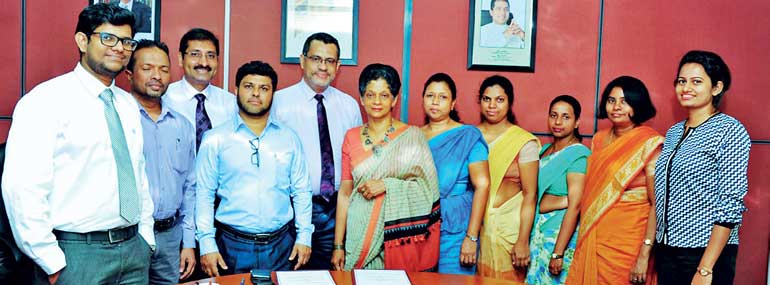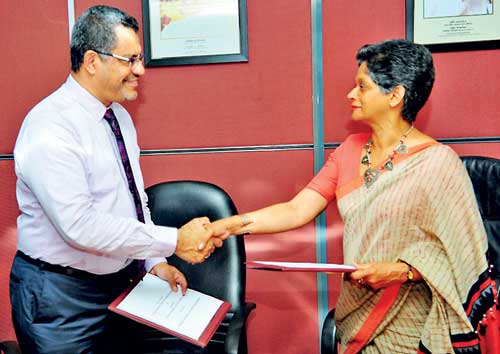Saturday Feb 21, 2026
Saturday Feb 21, 2026
Tuesday, 26 December 2017 00:00 - - {{hitsCtrl.values.hits}}

Lanka Rubber Global Consortium Chairman Mohideen Cader and Sri Lanka Export Development Board Chairperson and Chief Executive Indira Malwatte signing the Memorandum of Understanding

The Sri Lanka Export Development Board (EDB), having collaborated with the Asian Development Bank, carried out a study to identify issues being encountered by companies in their value chains pertaining to a few identified sectors in Sri Lanka such as rubber, fruits and vegetables with the objective of assisting them to address some of the major issues hindering exports.
One of the issues identified by the study was that though these companies individually are in a weak position to address the common issues prevailing in the value chain, a collective effort might bring solutions that could be executed through the Cluster Development and Financing approach accepted across the world. 
Giving impetus to the rapid adoption of the ‘collaborate to compete’ theme, Sri Lanka has embraced a novel concept. Known as ‘Special Purpose Vehicle Entity’ or simply referred to as SPV, it is a new economic collaboration platform which connects corporates with homogenous needs, competencies and business interests with the aim of mutual prosperity.
The EDB, together with the ADB and rubber sector stakeholders, undertook the pioneering initiative to establish SME Clusters by way of the formation of a SPV entity which has been a widely adopted mechanism across the world.
Following the above framework, five major Sri Lankan rubber sector exporters have marked a new chapter in the country’s business economy by coming together to form a business alliance under the umbrella of a SPV named the Lanka Rubber Global Consortium (LRGC), which was officially launched on 18 May 2017.
Lanka Rubber Global Consortium Ltd. is duly incorporated as a SPV to engage collaboratively in business activities pertaining to value chain development and supply chain management processes in polymer and allied industries with a view to remain competitive in global markets in a sustainable manner.
For the first time in Sri Lanka, the consortium has brought together rubber sector manufacturers, exporters, the Exports Development Board, Asian Development Bank, rubber sector consultants from local and foreign domains and many other stakeholders around a single entity.
The strategic aim of the SPV is to build, grow and sustain a global brand for Sri Lankan rubber products and to become the dynamic one-stop shop for buyers, investors, business opportunity seekers, joint venture partners and other interested stakeholders to seek new business opportunities and for members to efficiently and reliably identify suitable business opportunities across the globe.
The concept of SPV is widely used in many developing countries and is considered an ideal strategy for export development through SMEs. Pursuant to this objective, the EDB facilitated the operations of the LRGC to commence its work from the EDB based on the model of EDB’s Public-Private Partnership (PPP).The EDB has entered into a Memorandum of Understanding (MOU) with Lanka Rubber Global Consortium Ltd.
The consortium consists of five rubber sector companies namely Jafferjee Brothers Exports Ltd, Polymer Products Impex Ltd, Sinwa Holdings Ltd, Textrip Ltd and Microcells Ltd.
LRGC Chairman Mohideen Cader signed on behalf of the Lanka Rubber Global Consortium Ltd. while Sri Lanka Export Development Board Chairperson and Chief Executive Indira Malwatte signed on behalf of the EDB.
Speaking at the occasion, Malwatte stated that this was a significant milestone for the rubber industry in Sri Lanka where different stakeholders would meet together to boost the exports of rubber-related products.
The Lanka Rubber Global Consortium, in addition to encouraging and channelling the collective strength of Sri Lankan rubber sector manufacturers, raises the bar of “operational excellence” in the Sri Lankan rubber sector by allowing local brands to benchmark with global standards and industry best practices, which ultimately enhances the status of the rubber industry in the country.